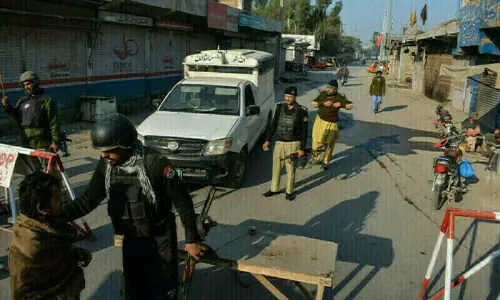KARACHI: The sixth death recently recorded in the city and seventh in Sindh caused by Naegleria fowleri — also known as the brain-eating amoeba — has revived concerns regarding unsatisfactory chlorination of water in Karachi.
The Karachi Water and Sewerage Board (KWSB), which is primarily responsible for water supply to the metropolis as a charged service, is understood to have made sure that the tap water is properly chlorinated.
Know more: Naegleria claims its seventh victim in Sindh
However, many neighbourhoods do not receive proper supply of water at all and a large number of them that manage to get water, do not get chlorinated water — a fact many officials in the city and provincial health departments concede.
“Around half of the city’s population — up to 45pc to be precise — do not get tap water with proper chlorination,” said a senior health official.
“This opens all sorts of dangerous prospects as water, which is not properly chlorinated, exposes its users to every dangerous health hazard, including Naegleria, which is lethal and no cure is available to save its victim,” said the official.
Citizens horrified by brain-eating amoeba’s lethality feel the need to make sure that their water supply is safe.
In this situation, people are only left with a solution to mitigate the danger of Naegleria — that is paying from their own pockets for chlorination.
Taking advantage of this public concern, the people who deal in medicines have found the opportunity to make their business flourish by selling chlorine tablets; similar to those dealing in fumigation and mosquito repellents, who cash in on dengue fear.
And here come advertisements in newspapers and on websites of various outlets offering chlorine tablets of different potency depending upon the quantity of water needed to be purified. It ranges from a bucket of 20 litres to a water tank containing 3,000 litres of water.
“We offer chlorine tablets priced Rs5 to make a bucket of water safer for taking a bath or ablution,” said Mohammad Asif, who deals in medicines.
He said he had imported chlorine tablets from abroad for larger water tanks, which were priced between Rs125 and Rs150.
“People prefer to use the tablets of 8.68 gram for their water tanks instead of 67 milligram tablet, which could chlorinate just a bucket of water,” he added.
The demand is so huge for local pharmacists that their stocks of large and expensive tablets have exhausted.
“Right now,” said another pharmacist, who introduced himself as Qasim, “we are offering the cheaper tablets until a fresh stock of high-intensity tablets arrives.”
Officials in the provincial health department conceded that people were spending thousands of rupees from their own pocket to protect themselves against Naegleria by purchasing chlorine tablets.
They added that in addition to this people were forced to spend more than double to what they spent on chlorine tablets on the purchase of mosquito repellents, coils, mats and fumigation services to protect themselves against dengue.
“Proper chlorination of water, as had been practice in the past, and a better vector control programme of the government could provide ample protection to the people against these lethal diseases and save people’s hundreds of millions of rupees that are being spent on the purchase of protection gears and chemicals,” said a senior official.
KMC tablets for households
Meanwhile, officials in the Karachi Metropolitan Corporation (KMC) health department said that they were distributing chlorine tablets among town health officers for limited use at households receiving poor quality water.
Sources said the town health officials were also being provided with results of water samples drawn daily from their respective areas so that they could also take preventive measures against the spread of Naegleria.
Officials said areas like Gulshan, Gulberg, Gulistan-i-Jauhar, Korangi, Landhi, North Karachi, Lyari and Keamari received water supplies with insufficient chlorine. Water samples taken from some localities had even no traces of chlorine.
Officials said the local health authorities had received a large number of chlorine tablets from the World Health Organisation, which were being distributed among the households particularly of those areas where Naegleria had affected and killed people or recent surveys gave dismal chlorination levels in the collected water samples.
On the methods being used for checking chlorine levels, the officials said that the staff of the KMC and the KWSB used a chlorine meter to measure its level in water. Even separate tests after the collection of 15 samples by the KWSB and the KMC personnel gave the same results.
Officials said a single purification tablet could be used for purifying 10 to 15 litres of water after two to three hours of putting the tablet in the water. The water can be used for drinking or taking a bath.
Officials at the KWSB claimed that the utility ensured that 2.5 part per million (ppm) chlorine was added at all the filter plants.
The deadly amoeba has killed seven people in Sindh this year, including its youngest nine-month-old baby girl victim, who died last month.
The first death this year was reported on May 27 in Gulistan-i-Jauhar.
The deadly disease surfaced in the city with extreme lethality in 2012 when it claimed 10 lives. Since then it claimed 20 lives.
Swimming is considered to be one of key factors that cause the primary amoebic meningoencephalitis.
The amoeba can only be eliminated by proper chlorination or boiling of water.
The amoeba travels through the nasal cavity and only affects the brain.
The illness attacks a healthy person three to seven days after exposure to contaminated water with symptoms of headache and slight fever, in some cases it is associated with sore throat and rhinitis (commonly called stuffy nose).
Published in Dawn, August 16th, 2014

































